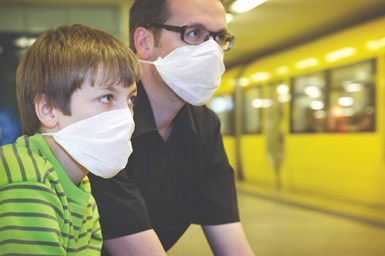EPA Authorizes Virucidal Registration for Copper Alloys
The U.S. EPA has confirmed the virucidal effect of certain copper alloys after examining data from the Copper Development Association, allowing the association to recommend copper alloys against COVID-19.

The U.S. Environmental Protection Agency (EPA; Washington, D.C.) has announced that certain copper alloys provide effective long-term protection against viruses, including SARS-CoV-2, which causes COVID-19. The Copper Development Association (CDA; McLean, Va.) says the EPA's approval makes these alloys the first and only products registered for nationwide use with residual, long-lasting efficacy claims against viruses. This EPA action granted an amended registration to the CDA, allowing it to add unprecedented virucidal claims to its existing registration — which currently permits claims against bacteria, including the antibiotic-resistant hospital superbug MRSA.
"The EPA's action enables the broad-spectrum and enduring public health benefits of copper alloys to be deployed in the fight against COVID-19 and future viral pathogens," says Thom Passek, president of CDA. "We are grateful for EPA’s forethought and proactive support to bring this innovative and scientifically-proven solution to the table."
To earn virucidal registration, CDA provided extensive data on harder-to-kill viruses, demonstrating long-lasting virucidal efficacy. Results showed that certain copper alloys continuously kill >99.9% of several viruses, including SARS-CoV-2 and Rhinovirus, within two hours of contact.
Products made from copper alloys can form a wide range of durable surfaces, including doorknobs, handrails, desktops and much more. The alloys are the first products to be included on the EPA's List N Appendix, which contains virucidal products with residual, 24/7 effectiveness — as opposed to conventional disinfectants that only work upon application.
The CDA would like to remind readers that copper alloy surfaces are a supplement to, and not a substitute for, standard infection control practices, including the need to follow public health guidelines and critical precautions such as mask wearing, social distancing and ventilation.
Related Content
-
Successful South African Plater Beating the Odds
Remaining focused on quality and reliability, Team Plating Works stays profitable in a volatile and challenging economy.
-
How to Choose Between Sulfate and Chloride-Based Trivalent Chromium
There are several factors to consider when choosing between sulfate and chloride-based baths for trivalent chromium plating. Mark Schario of Columbia Chemical discusses the differences and what platers should keep in mind when evaluating options.
-
Possibilities From Electroplating 3D Printed Plastic Parts
Adding layers of nickel or copper to 3D printed polymer can impart desired properties such as electrical conductivity, EMI shielding, abrasion resistance and improved strength — approaching and even exceeding 3D printed metal, according to RePliForm.
















